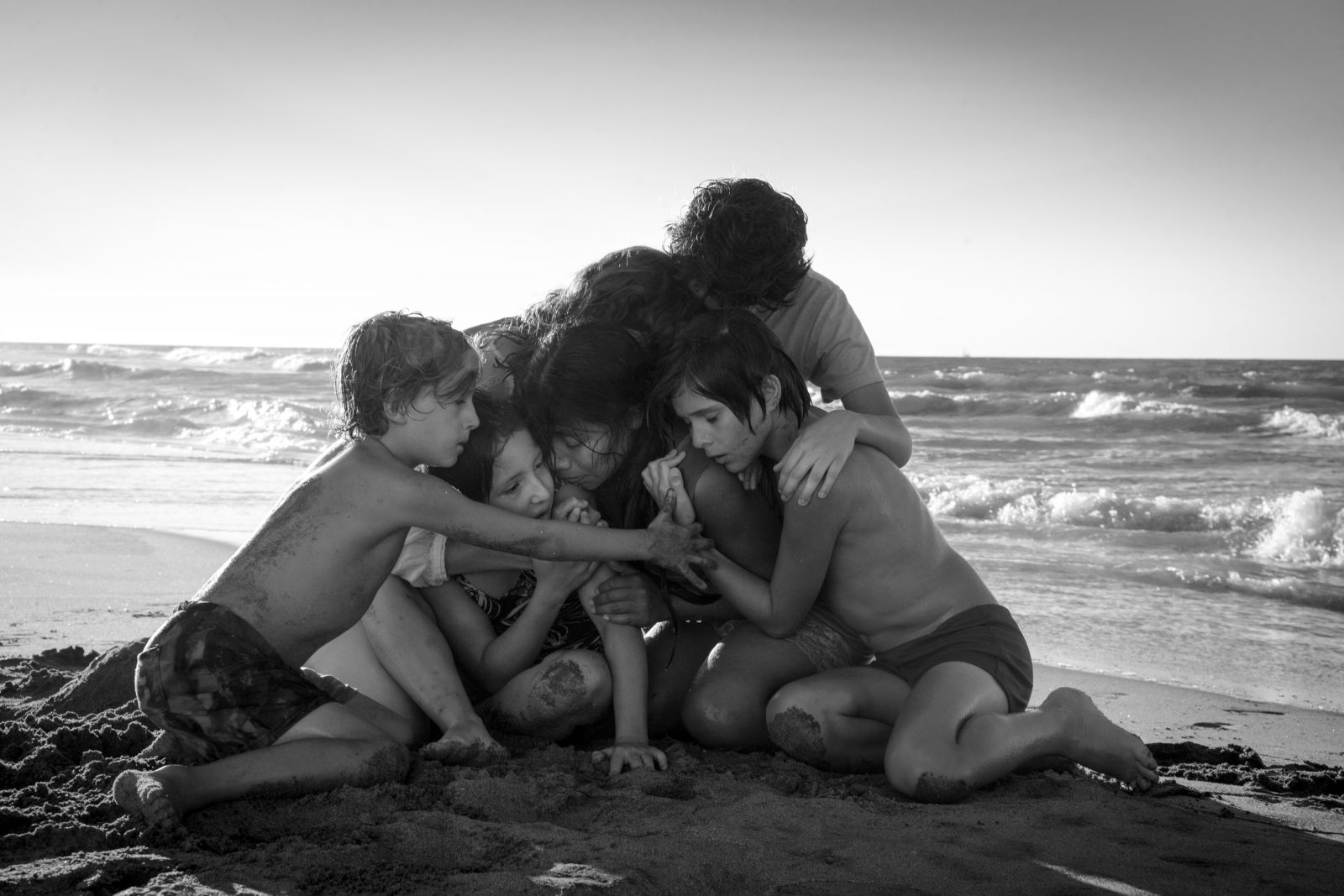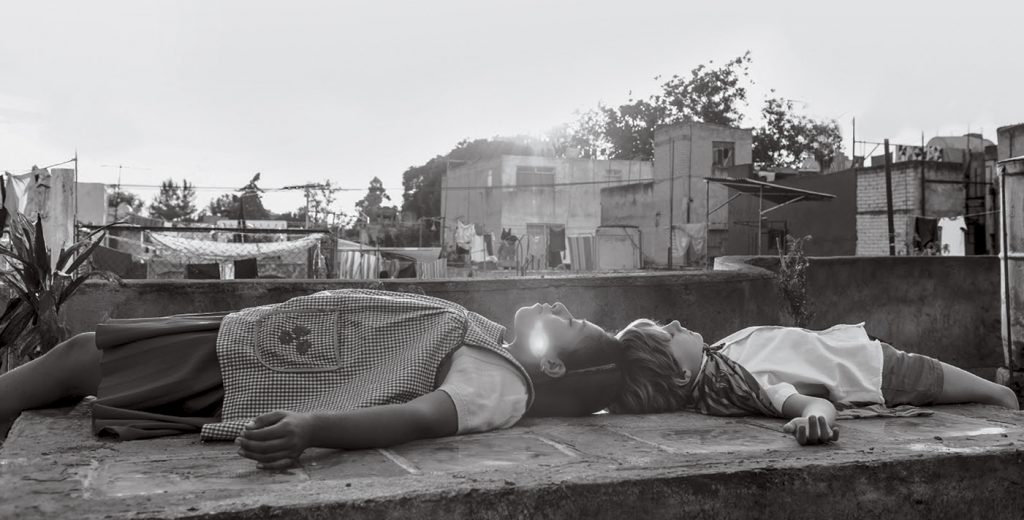Alfonso Cuarón’s Roma has generated a storm of awards season buzz and an outpouring of emotion from audiences worldwide. The film, which follows a year in the life of Cleo, a young mixteca woman working as a domestic employee at the service of an upper-middle-class family in Mexico City’s Colonia Roma, is largely based on Cuarón’s own upbringing under the care of his nanny Libo Rodríguez. Roma has also sparked conversations on the cinematic representation of indigenous communities and Latin American domestic workers, whose stories are often told from the perspective of elites.
In a previous story, we covered the meticulousness with which the sounds of Roma were curated. It was a three-year undertaking by music supervisor Lynn Fainchtein, who dug into dozens of archives to recreate Mexico’s 1970-1971 cultural landscape as faithfully as possible. Many of Fainchtein’s music selections – from La Revolución de Emiliano Zapata to Juan Gabriel and Lupita D’Alessio – ended up on the film’s fantastically nostalgic soundtrack, yet Cuarón felt Roma’s musical potential had not yet been fulfilled. Working alongside Fainchtein and fellow music supervisor Randall Poster, Cuarón invited numerous international artists to participate in a project of covers and original songs inspired by the film.
“When Alfonso started talking about the possibility of making songs inspired by the film,” explains Fainchtein, “we began exchanging names of artists whose music we knew he loved and then reaching out to their respective teams.” After months of calls, emails, and private screenings, the result is an immersive 15-track album titled Music Inspired by The Film Roma, which boasts names of an impressive international caliber while also capturing each artist’s unique reaction to the film.
Those distinct impressions and interpretations vary wildly, like with New York City’s punk and poetry icon Patti Smith, whose evocative reimagining of her 1996 song “Wing” glides effortlessly over slide-guitar and minimal instrumentation. Posing an exquisitely baroque contrast to Smith’s subtlety, Beck’s much-publicized orchestral cover of Colourbox’s “Tarantula” imbues the quirky new-wave song with regal majesty.
“I felt really fortunate because [Cuarón] was so willing to give me freedom,” says Colombian-Canadian pop star Jessie Reyez, commenting on her experience over the phone. “He said, ‘Wherever the movie takes you, I want you to express it.’ And it was just really dope to have that trust from him to deliver creatively.”
“You see her taking care of everyone, but who actually takes care of her?”
Reyez is one of five Latinx and Latin American artists on the album, and her song “Con el Viento” finds an emotional center in what she describes as “not quite love, but a violent infatuation,” an indirect allusion to Cleo’s devotion to her employers. The song’s opening lyrics set the tone: “Peleamos otra vez/la casa está encendida/y si me quedo es suicida,” also harkening to Roma’s gut-wrenching forest fire scene, another key source of inspiration.
You can hear sounds of burning wood and a camotero’s whistle (from Mexico’s popular sweet potato vendors) at the beginning of “Con el Viento,” recurring atmospheric choices that pop up across the album. Cuarón’s team provided sample packs with sounds harvested from the film to all the artists, adding ambiance and clear links between each song and the vivid world recreated in Roma.
Cuarón decided not to commission a score for the film, allowing Mexico City and all its vibrant whirring to do the job for him. Album opener “Tepeji 21,” the actual address of the Roma household, collects and showcases the never-ending stream of neighborhood sounds that include chirping birds, barking dogs, screaming children, and running water. It is simultaneously the most subtle and illustrative track of the bunch.

From art direction to its historical context, Roma has many thoughtful and eye-catching focal points. Yet, overwhelmingly, it’s Yalitza Aparicio’s portrayal of Cleo that has resonated most deeply with audiences. Ibeyi’s stunning “Cleo, Who Takes Care Of You” is a direct ode to the character’s unyielding presence as a caregiver. Speaking over Skype, Lisa-Kaindé Díaz of Ibeyi notes how she was struck by the largely one-sided support Cleo offers her employers and how it leads to her own physical and emotional neglect. “You see her taking care of everyone,” she says, “but who actually takes care of her?” As a daughter of the orisha Yemayá, Díaz also had a profound reaction the film’s climactic beach scene, where Cleo’s perilous dive into the ocean cleanses her of the grief and guilt she carries throughout Roma’s third act.
“One was a piece accurate to the period, and the other one was with artists close to Alfonso’s heart.”
On a more abstract song, like DJ Shadow’s “We Are Always Alone,” the superstar producer builds on the devastating honesty of the scene in which Marina de Tavira’s family matriarch, drunk and distraught over her crumbling marriage, hurls those exact words at Cleo. The song drones introspectively, allowing the listener to ponder the phrase, laced with the foreboding and empathy most audiences have expressed towards Cleo and her constantly overwhelming circumstances.
“We really like how the song fits perfectly within the description of the character for which it was made,” says Israel Martínez of Sonido Gallo Negro, whose “Cumbia del Borras,” dedicated to the family’s mischievous dog, is easily the album’s whimsical high point. “The creative process was quite natural,” he explains. “We sent the first cut to Cuarón and he approved it immediately. We already had the studio in top shape since we’ve been working on our new album, so the whole recording process flowed nicely.”
Unexpectedly, Cuarón’s daughter Bu was also invited to participate in the ambitious musical project. Scouted by Lynn Fainchtein, who’d heard tracks the 16-year-old recorded casually with friends, “PSYCHO” is a polished and ultra-modern pop song that fits squarely within the album’s overarching themes of empathy and introspection.

The process of assembling the original album, which is completely different from a film soundtrack, was about finding artists and moods that complemented each other to tell a greater story. While Fainchtein’s first time taking on this kind of herculean endeavor came in 2000 on Alejandro González Iñárritu’s classic film Amores Perros, where aside from a soundtrack, an album of original songs was also conceived, the goal has always been for the projects to touch as many hearts as possible.
On the differences between her roles as music supervisor and co-curator of Music Inspired By The Film Roma, she concisely sums up: “One was a piece accurate to the period, and the other one was with artists close to Alfonso’s heart.”
Music Inspired By The Film Roma drops on February 8 via Sony Music Masterworks.







